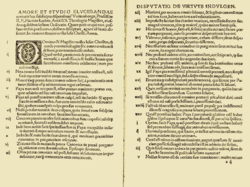| Part of a series on the |
| Reformation |
|---|
 |
| Protestantism |
| Part of a series on |
| Protestantism |
|---|
 |
| |
Protestant Reformers were theologians whose careers, works and actions brought about the Protestant Reformation of the 16th century.
Contents
- Notable precursors
- Magisterial Reformers
- Lutheran
- Reformed
- Anglican
- Radical Reformers
- Anabaptist
- Schwenkfelder
- Unitarian
- Second Front Reformers
- Anabaptist 2
- Counter-Reformers
- See also
- References
- Further reading
In the context of the Reformation, Martin Luther was the first reformer, sharing his views publicly in 1517, followed by Andreas Karlstadt and Philip Melanchthon at Wittenberg, who promptly joined the new movement. In 1519, Huldrych Zwingli became the first reformer to express a form of the Reformed tradition.
Listed are the most influential reformers only. They are listed by movement, although some reformers influenced multiple movements and are included in each respective section.
